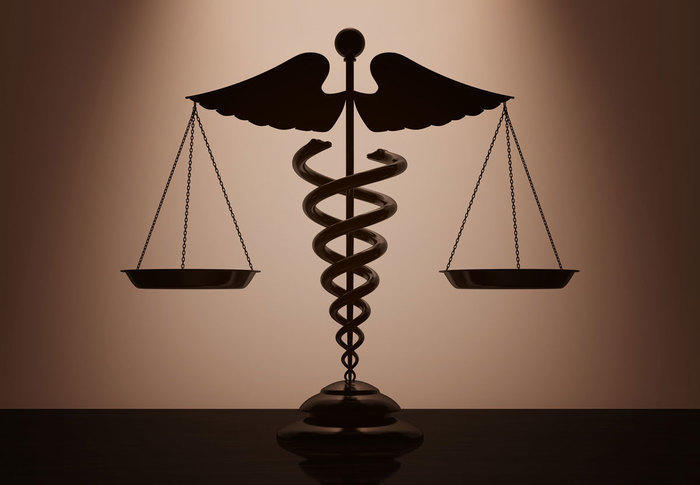The definition of this area of law is painfully simple: Health care law regulates the health care industry. It governs the relationship between health care providers and recipients. Health care law encompasses numerous intertwined legal matters and issues.
What is Healthcare Law?
As a health care lawyer, you may focus on a single issue of law to that field, or you may offer comprehensive legal services for a health care organization. Here are some of the major areas of health care law:
Compliance
There are several health laws and regulations that stakeholders in the health care industry need to comply with. Laws such as COBRA and HIPPA help ensure that health care providers follow the laws and offer the highest standard of care.
Fraud and abuse
One of the major mandates for health lawyers is to combat fraud and abuse in the health care industry. There are several facets of health care fraud, including insurance fraud, drug fraud, and professional misconduct. A health care attorney may work for a state or federal attorney's office that handles such cases.
Insurance and the third-party payer system
Third-party payers play an integral role in the U.S. health care system. Patients usually look to private insurance providers to cover a part of their health care cost.
Government-sponsored insurance programs such as Medicare may also cover health care costs. Individuals may pay for health insurance out of their own pockets or receive it as an employment benefit.
In this instance, health lawyers ensure their clients are compliant with insurance laws. They also help litigate disputes between health insurance providers and their clients.
Establishment and management of health care organization
Health care service providers depend on health care attorneys to help them incorporate and operate. Once a health care organization has been set up successfully, it may need help with operational issues such as contracting with service providers. A health lawyer will ensure that this is done within the provisions of all applicable laws and regulations.
Manufacture of medical equipment and pharmaceutical products
Producing a new drug or medical equipment involves a lot of research and hard work. Medical device manufacturers and pharmaceutical companies need health care lawyers to take them through the intricate approval process.
These lawyers may also help their clients to draw contractual agreements from the sale and marketing of their products. Moreover, they can help their clients to litigate on any issues that may arise concerning drugs or medical equipment.
Medical malpractice
A health lawyer can represent a patient or health care provider in a medical malpractice case, such as when a patient claims to be a victim of medical negligence. Each state has its own laws and regulations for medical malpractice claims.
Seven Major Health Care Laws in the United States
There are several federal laws that govern health care services in the United States. Let's look at seven of these laws:
Social Security Amendments of 1965
These amendments led to the establishment of the federal Medicare and Medicaid programs. Medicare is tasked with offering government-sponsored health insurance assistance to senior citizens.
Medicaid, on the other hand, is government-funded health insurance for low-income households. Every U.S. state oversees its own Medicaid program according to federal guidelines.
Health care Quality Improvement Act (HCQIA) of 1986
HCQIA was created to ensure the immunity of medical professionals and organizations during conduct assessments. It protects medical practitioners from peer review-related litigations. It also encourages them to file official complaints when they encounter unprofessional peer conduct.
Patient Protection and Affordable Care Act
Enacted in 2010, the Patient Protection and Affordable Care Act expands the eligibility of Medicaid. It requires every citizen to purchase insurance and insurers to accept all applicants. Under the Act, it would be an offense for an insurer to discriminate an individual based on a pre-existing condition. Moreover, insurers are required to charge uniform rates no matter the individual's medical history.
Children's Health Insurance Program (CHIP)
CHIP was established to ensure that every child living in a low-income household has health insurance coverage. The program has successfully provided insurance to many underprivileged children across the country. It is funded by the federal government and the respective states.
Emergency Medical Treatment & Active Labor Act (EMTALA)
Passed in 1986, EMTALA requires health care providers to offer medical care to any individual in an emergency regardless of whether the person can pay for the services or not. If the health care provider cannot provide the required service, it should transfer the patient to a suitable facility.
Consolidated Omnibus Budget Reconciliation Act (COBRA)
COBRA allows families and individuals to retain group insurance for a specified period after termination of employment. Since employers typically provide health insurance, a job loss by the breadwinner may leave a family without health insurance. Thanks to COBRA laws, the employer will have to keep the employee on the company's insurance plan for a given time after the end of their employment. This extended coverage ensures the employee has health insurance while they research and arrange for other options.
Health Insurance Portability and Accountability Act (HIPAA) of 1996
HIPAA allows U.S. workers to carry health coverage from one job to the next. Under the Act, workers can also apply to a particular group of health insurance plans as a replacement for lost coverage. This also allows for adjustments for changes in the family like birth, adoption, or marriage.
Under HIPAA, it would be an offense for an insurance provider to discriminate against policy applicants based on health issues. Furthermore, HIPAA upholds state laws that protect the insurance rights of workers.
When Does Someone Need a Health Care Lawyer?
We've said here that health care lawyers deal with laws that govern the operations of health care institutions, like hospitals and nursing homes. They usually represent health care organizations and professionals by giving them legal advice and helping them draft company policies.
A health care attorney can also assist in investigations and litigation for violation of health care laws and regulations. So, how does someone know if they need a health care attorney?
A health care employee or organization may need a health lawyer to help with the following issues:
- Government investigations
- Contracts and company policies
- Complying with regulations such as the Stark Law, the False Claims Act, and the Anti-kickback Statute
A patient would need a health attorney to help with:
- Payment disputes
- Health insurance issues
- Discrimination by a health care provider
Also worth mentioning is that further guidance from a medical malpractice attorney could be necessary if the client suffered injuries following a medical procedure.
What Are the Qualities of a Good Health Care Lawyer?
Health care law is quite complex, and clients will be looking to work with a reputable lawyer who is an expert in their field. Here are some of the qualities a health care lawyer should possess:
- Inquisitiveness – A good health care attorney should have a curious, open mind as well as a thirst for knowledge. Additionally, they should be careful and methodical thinkers.
There is an overwhelming number of regulations in the health care industry. Each of these requires specific skills and expertise to navigate. An experienced health care attorney should understand the regulations, the law, and be fully clear as to their client's needs.
- Detail-Oriented – A reputable health care lawyer should be analytical and have excellent attention to detail, and they should be very comfortable dealing with the government. They should be able to relate options, risks, and benefits in a way their client understands. If you are put off by the thought of working in a highly-regulated industry, then you may want to think twice about becoming a health care lawyer.
How to Become a Health Care Lawyer
To become a health care lawyer, you must be a licensed attorney. You must also have completed a Juris Doctor Degree program as well as passed your state's bar exam. It's also advisable to take various courses in health care law as you pursue your law degree. In addition, seeking internship opportunities with health care institutions will help maximize your employment opportunities.
Obviously, you can't achieve all of these requirements and suggestions overnight. It's a process that can take several years. Here's a step-by-step breakdown of what it takes to become a health care lawyer:
Get a Bachelor's Degree
While law schools normally require that health care law applicants possess a bachelor's degree, the U.S. Bureau of Labor Statistics (BLS) shows that there's no specific undergraduate degree required. According to the BLS, many law students possess bachelor's degrees in history, government, economics, or other fields.
You stand a better chance of becoming successful in health care law if you complete your undergraduate studies in health studies, health care management, or health care administration. With a degree in any of these programs, you will learn the policy and operational aspects of the health care industry. Such knowledge will come in handy when studying or practicing health care law.
Take The LSAT
Most U.S. law schools require that you submit your Law School Admission Test (LSAT) scores. An LSAT is designed to evaluate your reading, critical thinking, and analytical reasoning skills. You may take this test during your junior year of undergraduate studies.
Get Your Juris Doctor Degree
You can pursue your Juris Doctor Degree on either a full-time or part-time basis. A full-time Juris Doctor program typically requires three years of study. In your first year, you'll complete a curriculum that encompasses courses in basic law subjects, including:
- Property
- Contracts
- Torts
- Criminal procedure
In your second and third years, you will cover elective courses, clinical experiences, and judicial internships. In some law schools, you may be allowed to focus your second and third-year studies on health law, completing courses in:
- Medical malpractice
- Health care finance
- Administrative law
- Food and drug law
If you don't get the opportunity to complete courses focusing on health care law, you can take various electives in the field. This will help you understand the different legal aspects of the health care industry. Elective courses in health care law typically cover topics such as:
- Health care fraud and abuse
- Corporate issues in the health industry
- Comparative health law and policy
Pass the Bar Exam
Every U.S. state has its own bar exam, and you must pass this exam to get a practicing license. If you are looking to practice in several states, you'll probably need to pass bar exams for every state in which you want to do so.
Every law student wishes to pass their bar exam on the first attempt—and taking a prep course can make this endeavor come true. There are a number of private companies that offer bar exam prep courses to law school graduates.
Other than passing your state's bar exam, you may also be required to pass a professional responsibility exam in order to be a licensed lawyer. While the format of this exam differs from to state, most include several days of testing in the form of essays and multiple-choice questions.
Practice as a Health Care Lawyer
Once you pass your exams and get your license, you can practice health care law at private law firms, legal aid organizations, and government agencies. It's worth noting that legal aid societies usually require that prospective health care attorneys have at least two years of experience. You may need at least eight years of experience to work at a private law firm.
Consider Getting a Master of Laws
To take your career to the next level, you may go back to law school to acquire a Masters of Laws (LL.M.) in health care Law. Typically, LL.M. programs include courses that cover topics such as:
- Disability law
- Mental health law
- Elder law
- Disability law
- Assisted reproduction and the law.
In some law schools, you may be required to write a thesis before you graduate.
Where Can You Work as a Health Care Lawyer?
There are several options as to where you can work as a health care attorney. Let's explore some of the major options:
- Joining a law firm – These firms specialize in legal issues affecting the health care industry. Other firms may have a department dedicated to health care law. You can find opportunities in either of these options.
- Solo practice – You may decide to practice solo, specializing in one or two areas of the health care
- Teaching – You can decide to teach or tutor for a law school, medical school, or research institution.
- In-house counsel for a corporate entity – You also have the option of working as an in-house counsel for a large company. These organizations typically include pharmaceutical companies, medical device manufacturers, or hospitals.
- Provision of legal services to government agencies – As a health care attorney, you can provide services to local, state, and federal government entities.
How Much Does A Health Care Lawyer Earn?
A 2018 survey by the U.S. Bureau of Labor Statistics (BLS), the salaries of health attorneys vary widely depending on a number of factors, including:
- The lawyer's specialization
- Experience level
- Industry
The BLS findings state that senior law attorneys make a median of about $68,000 annually. On the other hand, intellectual property lawyers in the health industry make a median annual income of about $136,500. According to PayScale, health care lawyers earn an average income of $82,322 but have the potential to make as much as $162,823 annually. Medical malpractice lawyers can expect to make about $105,000 annually. If you decide to practice as a corporate health lawyer, you'll also have a high earning potential, as this area of specialization shows average annual earnings of $103,858.
How Do Health Care Attorneys Get Paid?
As a health care lawyer, how you get paid will depend on your billing method, and the legal issues you handle. Generally, health attorneys charge an hourly rate, particularly for more complex cases. Nonetheless, you can choose to charge either a flat rate fee or a contingency fee.
The contingency fee method is where you agree to accept payment only if your client receives compensation. Most attorneys don't take up cases on a contingency basis unless they're confident of getting a substantial settlement.
You may also ask for a retainer fee, which is paid when the client hires you. The retainer will then be deposited in a special account. You can then use these funds to cover any expenses incurred while working on the case. Usually, the retainer fee is a percentage of the overall pre-determined cost of services.
Final Thoughts
Health care law is one of the most complicated areas in the legal world. It covers the range of services that clients in the health industry would typically need. These services can be specific or related to the operations and regulatory issues of the industry. To sum it up, you must possess a bachelor's degree, get licensed after passing your state's bar exam, and gain experience practicing as an attorney if you want to become a successful health care lawyer.












